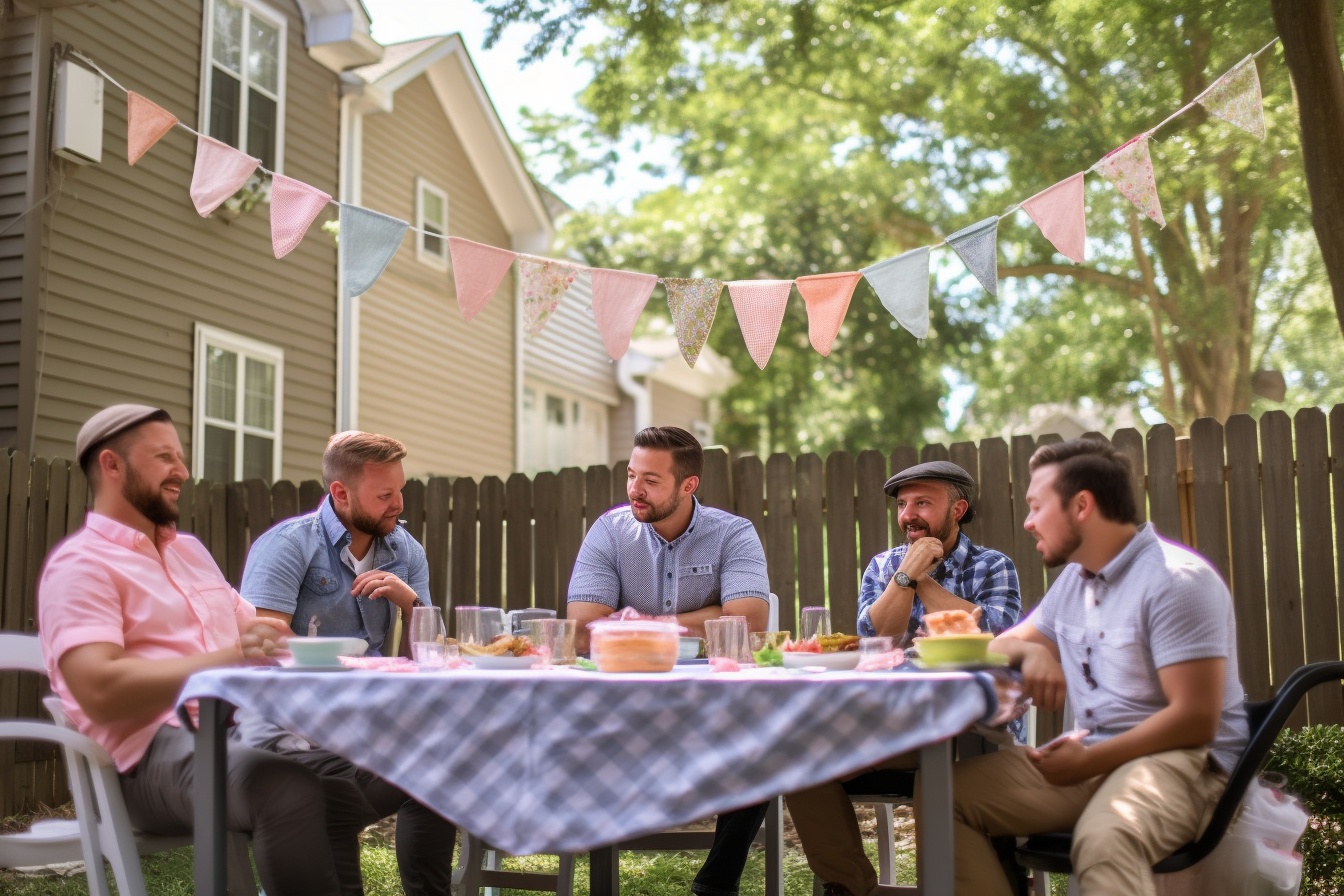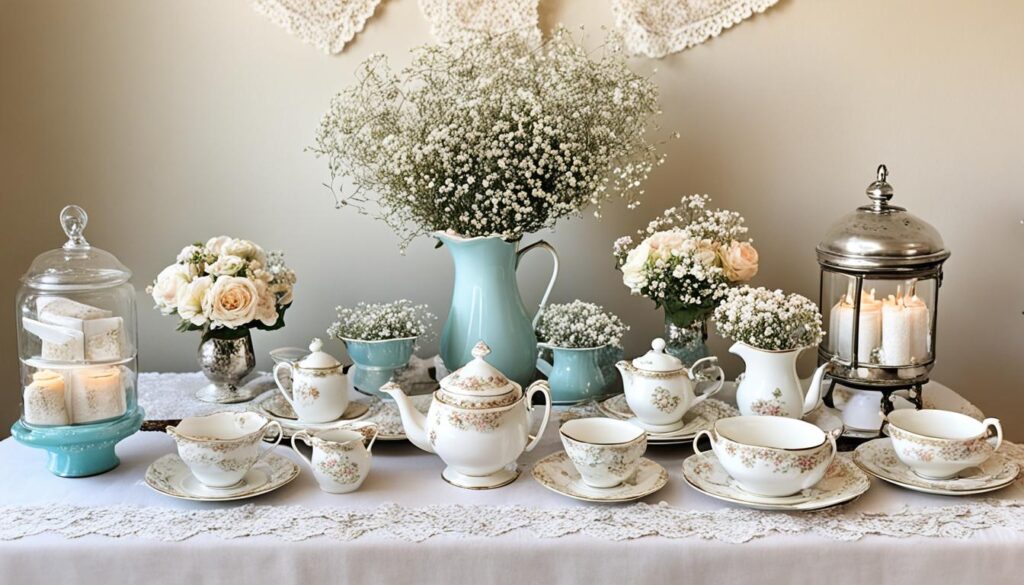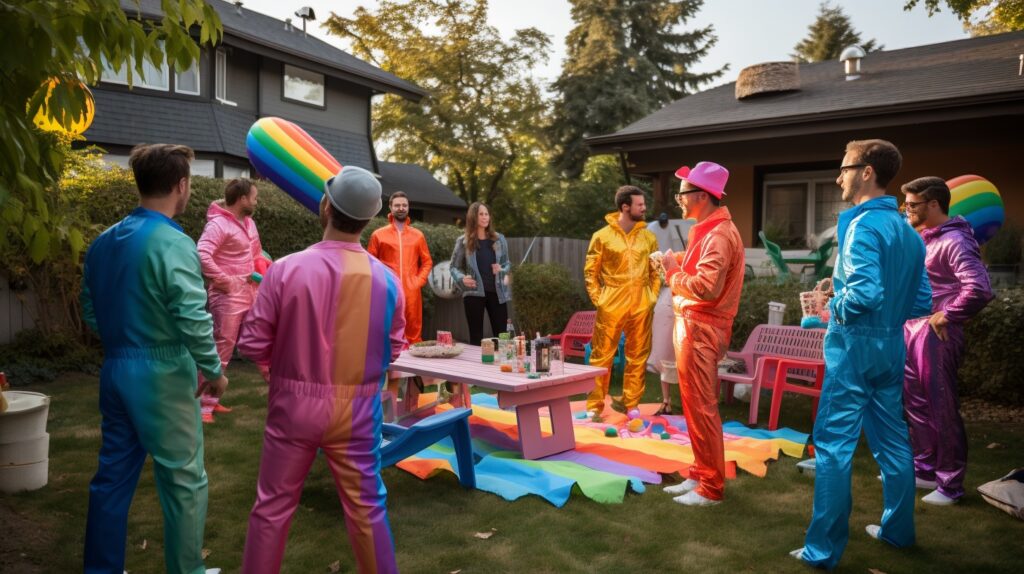Key Takeaway:
- Baby showers have evolved over time, from women-only events to inclusively celebrating all parents and families.
- The controversy surrounding men’s attendance is rooted in patriarchal and capitalist notions of discipline for women’s bodies, and stereotypes that perpetuate traditional gender roles.
- Shifting gender roles and attitudes towards parenting have led to greater acceptance of men’s attendance at baby showers, making them more inclusive celebrations for the modern norm.
The Evolution of Baby Showers
The evolution of baby showers is intertwined with social norms and cultural expectations. Exploring the history of this tradition from the 1800s and early 1900s, we will gain insight into the changing attitudes toward baby showers and how they have impacted modern expectations. From the earliest known baby shower in ancient Egypt to the rise of the modern baby shower in the 1940s and ’50s, this section will provide a glimpse into the evolving world of baby showers. Despite claims of uncertainty around baby shower etiquette, there are established customs and traditions that have been followed for generations. While it was once considered a female-only event, men have been attending baby showers for decades.
Baby Showers in the 1940s and ’50s
Mid-20th century baby showers were not as popular as today. In the 1940s and ’50s, women held teas or luncheons with close friends and family. Gifts were practical and often handmade, like diapers or baby clothes. These gatherings were not as elaborate as current baby showers. Gift etiquette was different then. Expectant moms didn’t register for presents at stores, nor did they ask for pricey gifts. Guests would bring homemade items or small tokens of love for mother and baby. Entertaining games weren’t part of the focus; it was about camaraderie and offering support. Interestingly, men rarely attended baby showers then. It was deemed an event for women only, without male involvement.Uncertainty around Baby Shower Expectations and Etiquette
Baby shower traditions have changed a lot over time. In the 1940s and ’50s, only women were allowed. Now, inviting men is okay. But, there’s still debate about their role. Should they join in women-only activities? Or are games still gender-biased? Things have changed. Fathers are more involved in child care. So, it’s normal for them to come to baby showers. However, some moms prefer female-only guests, especially when it comes to advice. If you’re unsure or think people may feel uncomfortable in a mixed-gender group, consider hosting two get-togethers. One for moms & dads (or co-ed friends). And another for females only. This way, everyone can enjoy the party.Men’s Attendance at Baby Showers Today
Men’s attendance at baby showers is now common. In the 1940s and 1950s, only women were invited. These parties were about maternal support. Today, both men and women are welcome. The increased involvement of men in child-rearing has led to them being included in these celebrations. This reflects changing attitudes towards parenting. Some criticize this trend, but it is a positive shift towards gender equality. Talking openly about childbirth with men is more normal. This has led to an increase in male participation in baby showers. There are still stereotypes, but they are less significant. Men are now more actively involved in preparing for parenthood. Baby showers are inclusive. They give friends and family a chance to support new parents, no matter their gender.The Controversy Surrounding Men’s Attendance at Baby Showers
The gender-specific conventions of celebratory events are being challenged at an increasing pace today. In this section, we will explore the hotly debated topic of men’s attendance at baby showers, shedding light on the controversies surrounding it. Specifically, we will examine the patriarchal and capitalist disciplining of women’s bodies, the stereotypes that surround men’s attendance, and the reasons behind the performance of baby shower rituals as a preparation for motherhood.The Patriarchal and Capitalist Disciplining of Women’s Bodies
Historically, society’s expectations and etiquette around baby showers have entrenched gender roles, and kept men from playing an active role in child-raising. Baby showers were designed to prepare women for maternity, and excluded men from the celebration. But, attitudes towards parenting have changed. Men are now taking on more roles in childcare, and women are demanding inclusivity. However, stereotypes about men attending baby showers remain. Rituals around childbirth have not kept up with changing gender roles. Studies from 2019 show that millennial fathers are caring for their children 8 hours a week, compared to 2.5 hours for dads born before the 1980s. Patriarchal and capitalist systems have had an influence on societal expectations around childbirth and parenting. It’s important to recognize this, and work against these systems. This way, all parents can celebrate their children in an inclusive environment that allows for equal participation, regardless of gender.Stereotypes Surrounding Men’s Attendance
Societal expectations have lead to stereotypes surrounding men’s attendance at baby showers. This is untrue, though, as many men take on significant roles in parenting these days. Unfortunately, negative perceptions of men at baby showers still exist. These beliefs can make men feel unwelcome or uneasy. However, it is important to recognize baby showers as inclusive celebrations, where all genders are accepted without judgement. In the end, the love and support for the new parents and their baby is what matters, not the gender of the attendee.Ritual Performances and Motherhood Preparation
Celebrating baby showers is important for motherhood preparation. It has changed over time. Rituals at baby showers help women prepare for being a mother. In some cultures, they paint pregnant bellies with designs and patterns. This symbolizes the anticipation of a new life growing inside. Baby showers are also a chance to give gifts and to hear from experienced parents. Expectant mothers get tips and advice about taking care of their newborn. These rituals support them in this new stage of life. Gender roles used to assign parenting solely to women. But now, fathers are more involved in baby showers and parenting. This evolution shows that parenting is a shared responsibility.
Shifting Gender Roles and Attitudes Towards Parenting
Shifting gender roles have led to men playing an increasingly important role in child-raising. However, men attending baby showers is not a new trend and has been happening for decades. In this section, we’ll explore different perspectives on celebrating parenthood and the inclusion of men.Men’s Increasing Role in Child-Raising
Societal attitudes towards parenting have changed. Men now have an increased role in child-raising. Studies show fathers are a significant part of their children’s lives, providing emotional support and even helping with household chores. This flips the traditional notion of fatherhood. Fathers are now taking on active roles in parenting. Baby showers are becoming more inclusive and recognizing fathers’ contributions. Fathers attending baby showers is now a normal thing. Discussing childbirth and parenthood with fathers is no longer seen as taboo. Baby showers have taken on a new purpose – providing emotional support and knowledge about raising children. Fathers’ involvement in child-raising is now more appreciated. Society is recognizing their value in the parenting process.Attitudes Towards Discussing Childbirth with Men
Men’s role in talking about childbirth has changed a lot lately. Men are present during childbirth more and more, and attitudes around discussing childbirth with them are much more welcoming than before. Also, baby showers are no longer for women only. Men attending baby showers is becoming popular too, as celebrations should include both parents and their family and friends. Baby showers give couples the chance to get ready for having a baby together. Gender roles for parenting are different now and this is changing how people think about fathers and talking about childbirth. Both parents are getting involved in preparing for the baby’s arrival. This helps break down gender stereotypes. It also makes it so couples can support each other when the baby arrives. To sum up, gender roles and attitudes towards parenting have had a big effect on how people think about fathers and talking about childbirth. Attitudes towards discussing childbirth and baby showers have changed for the better. Fathers have a bigger role in parenting today, and it’s important that they join in the discussions about childbirth. That way, parents-to-be can share the joy of having a baby together in a safe and supportive environment.Baby Showers as Inclusive Celebrations for the Modern Norm
Baby showers have changed. They now include both men and women. Before, only women celebrated. But, with men being more involved in parenting, they too now join in the fun. This shift was due to changing attitudes. Men are no longer just providing money, they are actively helping to raise kids. This has made baby showers a time for both parents-to-be to prepare. In the past, men were not invited to baby showers. It was seen as something only women did. But, as society is moving towards equality, this outdated view is fading away. Now, baby showers are a celebration for everyone involved.Should Men Be Included in Gender Reveal Parties for Twins as Well?
Some may argue that including men in creative gender reveal ideas for twins is important, as they are just as excited to find out the genders of their twins. Others may feel that the focus should remain on the expectant mother. Ultimately, it’s a personal choice for each couple to make together.
Five Facts About Inclusive Celebrations: Men’s Attendance at Baby Showers – The Modern Norm:
- ✅ Baby showers were traditionally only attended by women, but in recent years, men have become more involved. (Source: various)
- ✅ Baby showers became popular during the baby boom of the 1940s and ’50s. (Source: Parents.com)
- ✅ Baby showers are typically held four to six weeks before the due date, but some prefer to have them after the delivery. (Source: Parents.com)
- ✅ The host of a baby shower is traditionally a friend or distant relative, not a close family member. (Source: Parents.com)
- ✅ Baby showers are coded in ways that mask their performative and ritual functions; they prepare childless women for motherhood and uphold it as a desirable social role. (Source: gutsmagazine.ca)







